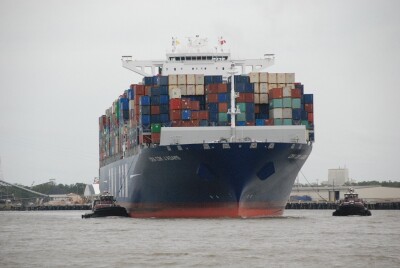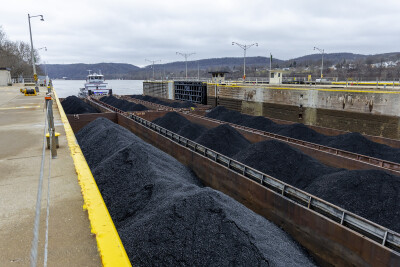As the presidential race heats up before the Nov. 3 election, Jones Act observers are keeping an eye on what candidates are saying about the 100-year old shipping law and how they would deal with it during their administrations.
Normally the Jones Act has been an untouchable and relatively quiet cabotage law that protects the U.S. shipping industry from foreign intrusion, garnering strong bipartisan support in Washington, while drawing scant public attention — unless efforts are made to dismantle it, which sends the shipping lobby into counterattack mode.
Presidents of both parties have generally supported the Act, which since 1920 reserves domestic shipping routes to vessels that are built (or rebuilt) in the U.S., manned by U.S. citizens and registered in the U.S. Buoyed by a well-financed shipping lobby that counts many well-placed lawmakers as supporters, presidents have resisted efforts to repeal or rewrite the law, often overruling dissenting voices within their own administrations that call the Jones Act an antiquated law that discourages competition, raises prices and is counter to open and free markets.
Shipping interests and maritime unions have a lot riding on this status quo, and are making financial contributions to supportive lawmakers, and reminding their members to vote for pro-Jones Act candidates. Opposition remains relatively weak by comparison and includes groups like the Cato Institute and a few federal and state lawmakers who favor free markets and limited government, energy industries such as oil and gas that want to move their products, and some foreign governments that want to enter U.S. coastwise shipping. They argue that restrictions in the law drive up shipping costs and restrict competition.
BIDEN: JONES ACT ADVOCATE
In the presidential race, Democratic nominee Joe Biden has been the most vocal, including the Jones Act as part of his “Made in All of America” economic platform, and writing directly to maritime unions reiterating his support.
“I have been a consistent and strong advocate for the Jones Act and its mandate that only U.S.-flag vessels carry cargo in the coastwise trade,” Biden said. “As president, I will continue my strong support for the Jones Act.”
He also underscored his support for U.S. cargo preference laws: “I understand that merchant ships do not sail, and U.S. merchant mariners do not work, unless they have cargo to carry.”
This position tracks Biden’s close ties to labor unions, and he has received endorsements from the Seafarers International Union (SIU), International Longshore and Warehouse Union (ILWU), the International Organization of Masters, Mates and Pilots (MMP), and the Marine Engineers Beneficial Association (MEBA).
“Just as unions are essential to the middle class, the U.S.-flag merchant marine fleet and the men and women who operate U.S.-flag ships are crucial to America’s national security, our international trade relationships, and economic development,” he wrote in accepting endorsements from MEBA and MMP.
Not many presidential candidates have been as public about the Jones Act, according to Colin Grabow, a policy analyst at the Cato Institute, a free market libertarian think tank in Washington, D.C., who has been highly critical of the Act and urges reforms. “Presidents of both parties have voiced support in speeches and prepared remarks, but to actually make it part of your platform early on, that was a bit of a surprise.”
President Trump’s Jones Act position is more muddled, as he has been less public about his position and considered several waivers to the law that troubled supporters. While the Jones Act would appear to fit his “Keep America First” campaign, some who have worked with him at the White House say he deeply dislikes the act.
“The good news is that not everyone is onboard with the Jones Act, namely President Trump,” Casey Mulligan, a professor of economics at the University of Chicago and former chief economist on Trump’s Council of Economic Advisers, wrote in an opinion piece in The Washington Times on June 3.
“He sees it for what it really is: a harmful regulation like the ones he has succeeded in eliminating from health insurance, telecommunications, farming and many other industries. Moreover, he hates that America has fallen so far behind shipbuilders in China, Korea and Japan. He and others on his staff find it ridiculous that nowhere on earth is there a single LNG carrier that fits the Jones Act criteria,” he wrote.
Mulligan and other senior administration officials said that Trump initially favored Jones Act reforms during internal talks at the White House. In his upcoming book, “You’re hired!: Untold Successes and Failures of a Populist President,” Mulligan cites an Oval Office meeting in May 2019 at which Trump endorsed a Jones Act waiver that would allow foreign-flagged ships to transport liquified natural gas from U.S. ports to Puerto Rico and the Northeast. Currently there are no U.S. ships that offer bulk LNG transport.
TRUMP NOW PRO JONES ACT
But Trump reversed himself after meeting with six Republican senators from Louisiana, Mississippi and Alaska, who made strong economic and national security arguments against a waiver.
“They convinced him that they would make (his) life so uncomfortable if he even did a waiver for the Jones Act, let alone repealed it,” Mulligan told the Examiner in a recent interview, citing the influence of the shipping lobby that mobilized against the waiver. These groups include the American Waterways Operators, the Shipbuilders Council of America and the American Maritime Partnership (AMP).
While the LNG exemption failed, the Trump administration did approve two temporary Jones Act waivers to facilitate emergency shipments after Hurricanes Irma and Maria. The oil and gas industry, seeking help during an unprecedented crash in oil demand due to the pandemic, asked Congress for a Jones Act waiver in March to facilitate movement of domestic energy products, but nothing became of that.
Given Washington’s historic support for the law, the shipping industry is confident that the Jones Act will remain intact and survive any future challenges no matter who occupies the White House. Advocates cite support from both Biden and his Vice President nominee Kamala Harris, and Trump’s decisions against Jones Act waivers and the alignment of the law to the president’s buy American and hire American agenda.
“American presidents for decades have supported the Jones Act and the American maritime industry (based on) commerce, national security and jobs, and we have every reason to believe that if there’s a change as a result of the election, a Biden administration would continue that support for the Jones Act,” said Michael Roberts, president of AMP, an industry-supported pro-Jones Act group, and senior vice president at Florida-based Crowley Maritime Corp.
As for Trump’s consideration of a waiver for LNG transport last spring, Roberts said it’s best to focus on the result — that the waiver wasn’t approved by the president. “At any crucial point during the last four years when a question about the Jones Act has come up, the correct decision was made that was in line with the president’s agenda,” he said. “President Trump doesn’t issue policy statements the way political candidates often do, so we don’t have a piece of paper we can point to saying the president supports the Jones Act. But based on the actual decisions taken by this president, we believe he’ll continue to be a supporter.”
With support from the White House and the most recent mobilization of pro-Jones Act GOP senators, there’s “no mood to push for reform,” Grabow of the Cato Institute admitted. “But even if it’s unlikely to be changed, (the Jones Act) deserves to be called out and analyzed.”





